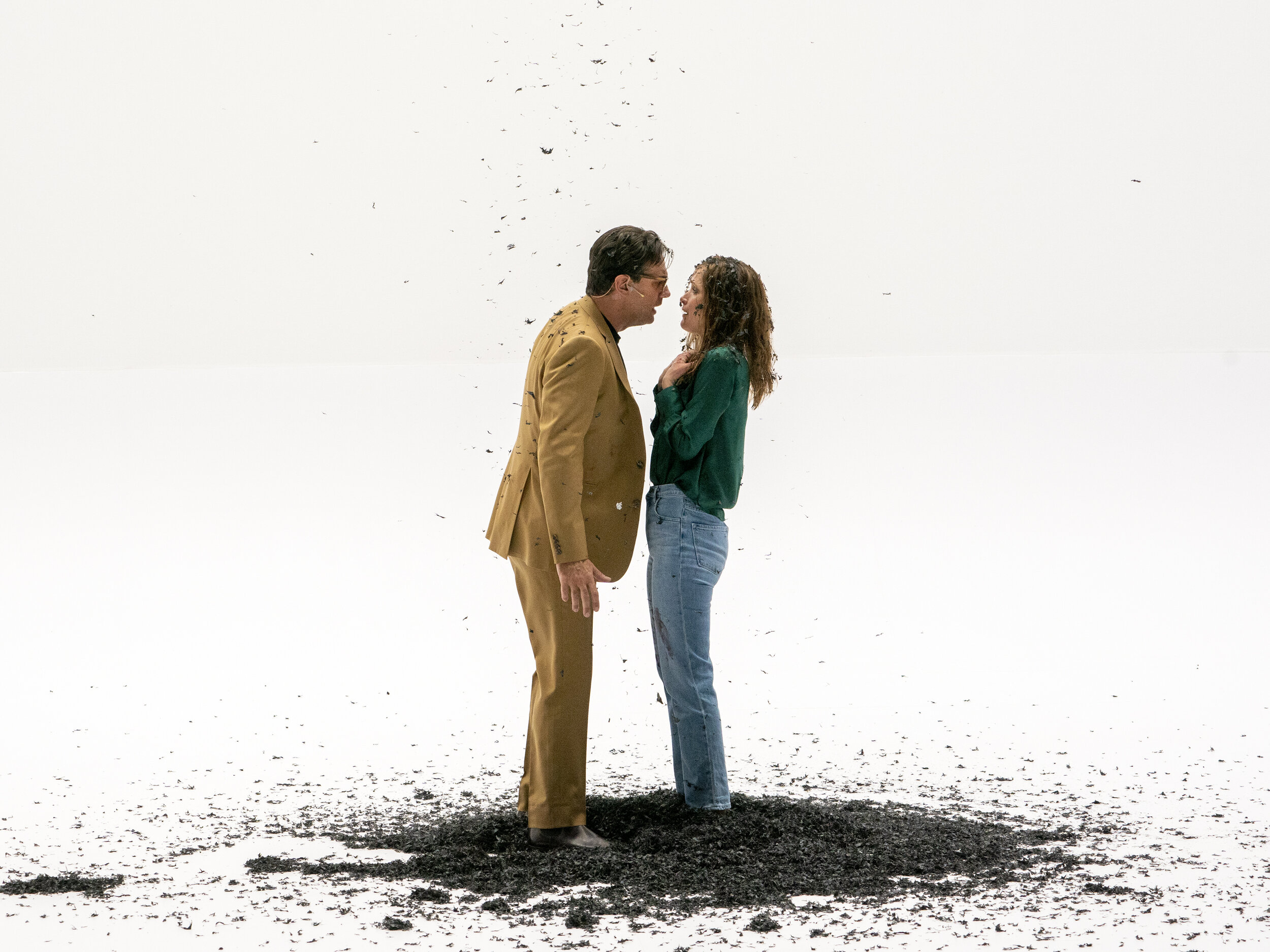Medea
Published February 4, 2020
The fires of rage in Medea burn hot, but in Simon Stone’s new adaptation, all we see are the ashes. Stone’s modern-day reworking of Euripides’ familial tragedy about an enraged woman who murders her children offers a more clinical, scientific scrutiny of the circumstances that led a mother to do the unthinkable. And, it is clear, Medea’s story is not as simple as might seem in a Cliff's Notes summary.
Inspired by 1995 case of Deborah Green, who poisoned her husband and burned down their home, killing their children, this production, also directed by Stone, stars real-life couple Rose Byrne as Anna (the Medea character) and Bobby Cannavale as Lucas (Jason). We first encounter the disconnected couple as Anna is released from a lengthy stay at a psychiatric hospital. Lucas intends to drive Anna home to reunite their two sons before returning to the apartment he shares with his much younger girlfriend, Claire.
Anna is eager to prove to Lucas that she has changed. “I was a different person then,” she assures him, her eyes slightly too wide as she cites the newly-prescribed cocktail of pharmaceuticals intended to stabilize her. “Anna will remain balanced. Don’t you worry.”
That statement immediately inspires skepticism, when, in her next breath Anna then informs Lucas she intends to win him back. Watching the massive screen hanging above the stage projecting close-ups of the cast’s faces, one immediately knows that this duo is doomed.
Staged on Bob Cousins’ stark white set, a vast and seemingly endless expanse, we see Anna’s reunion with her and Lucas’ children, her desperate attempts to regain her job and Lucas’ tension-ridden love nest with his new girlfriend. More domestic drama than epic tragedy, Stone’s script deliberately lays the path to catastrophe stone by stone as Anna becomes increasingly unwell. Pleading to work for the lab in which she and Lucas met and collaborated, she is informed by her boss, Christopher (Dylan Baker, in fine form as head of the old boys’ club) that she isn’t allowed inside the building. The accomplished research scientist is reduced to working sales in a closely supervised local bookshop, supervised by the affable Herbert (Victor Almanzar).
Things are no better at home. Alcohol is not allowed with her pills, but Anna’s two sons find her passed out on the floor, surrounded by bottles they hide so Mom “won’t get in trouble again.” Played by Gabriel Amoroso and Emeka Guindo the night I attended, the children’s development of their characters a marked departure from the original text, and their taking on their parents’ responsibility is saddening.
Despite its clinical approach, Stone’s script is substantially lacking in realism. It’s difficult to believe that Anna’s overwhelmed and out-of-her-league social worker Elsbeth (Jordan Boatman) would leave the boys alone with their mother immediately following her release, let alone when her condition noticeably worsens. Anna’s job was a vital aspect of her identity, and we learn that she was Lucas’ superior in their lab. Their relationship boosted his professional standing substantially, while she stayed home with their children and helped him with his work at night. Anna’s furious monologue, accusing Lucas of taking her career from her and demanding he acknowledge the sacrifices she made, is thrilling, as Byrne reveals the depths of resentment and rage Anna had been holding for so many years.
Her education was put to use in her revenge – after learning of Lucas’ affair with Claire, Anna began slowly poisoning him with ricin from castor seeds. Even following her hospitalization, Anna shows no remorse for her actions, instead fondly reminiscing about when Lucas would lie in bed with her and the boys.
Byrne, known for her starring roles lighthearted comedies such as Bridesmaids and Like a Boss, is chilling as Anna, snapping momentarily from wild-eyed frenzies to chilling detachment. Her pain at Lucas’ abandonment is tangible, as is her simmering rage. Cannavale is subdued as Lucas, bespectacled and dressed in a poorly-fitting corduroy suit. His masculinity is subdued as he struggles to balance the demands of both women in his life, unable to satisfy either of them. It’s clear he knows he’s in over his head, but he also is unwilling to do what is necessary to resolve these problems.
Questions of accountability, or lack of it, infuse Stone's story. Anna is adamant that Lucas is to blame, informing him, “You could have stopped all of this,” while Lucas credits his affair with Claire to the death of passion in their marriage. “We’ve been together too long,” he tells his wife. Anna’s relationship to motherhood is undefined, her interactions with her children only seen during her downward spiral, but Stone hints at postpartum depression or psychosis when Anna laments having her sons, the agony of her 36-hour childbirth and asking, “Why didn’t the pain ever stop?”
Her grief is exposed and magnified, thanks to Julia Frey’s projections, with both serve and harm the show. Witnessing such anguish taking place in a sterile environment enhances and detracts from the play’s emotional impact. The filmed close-ups inspire intimacy but also portraits within a magnifying glass, inspiring clinical thoughts of medical diagnoses alongside sympathy for such pain. Stone's production could be subtitled, The Descent of a Woman.


